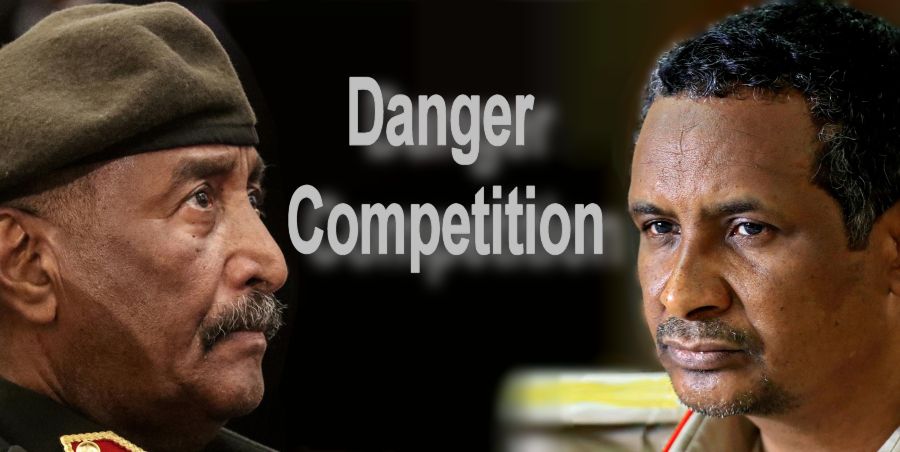|

The Sudanese capital was shaken by gunfire and air raids in the night and morning of April 21, as has been the case daily since the start of the fighting on April 15, which left "413 dead and 3,551 injured", according to a new report from the World Health Organization (WHO). Images of devastated Karthoum are looping on the Al-Jazeera channel.
"Our country is bleeding" -
“For Eid, our country is bleeding: destruction, desolation and the sound of bullets have taken precedence over joy,” General Burhane said. So far, like his rival, General Daglo, he had only spoken to the media and had not directly addressed the 45 million Sudanese.
Deadly clashes broke out on Saturday (April 15th) in Sudan between the Sudanese Armed Forces led by General Abdel Fattah al-Burhan, and the Rapid Support Forces, a paramilitary militia led by General Hemetti.
This violence is not a surprise. It is the culmination of several months of tension between the two groups and especially their two leaders. At the origin of this situation, a power struggle between the two most powerful generals of Sudan. On the one hand, the head of the army, Abdel Fattah al-Burhan, who de facto leads the country. On the other, his number two, General Mohamed Hamdane Daglo, nicknamed "Hemetti", at the head of the Rapid Support Forces (RSF, in English), a powerful paramilitary force.
To understand this rivalry, you have to go back to April 11, 2019. On that day, dictator Omar al-Bashir was overthrown by a military coup. Al Burhan and his junta take power. Hemetti is number two in the regime. Sudan is moving towards a transfer of power to civilians, but in October 2021, the military carries out a new putsch. Al Burhan and Hemetti are maneuvering to defeat the democratic transition.
How did we get here ?
In October 2021, the two generals therefore joined forces to oust the civilians with whom they had shared power since the fall of dictator Omar al-Bashir in 2019.
“A marriage of convenience” for the putsch, explains researcher Hamid Khalafallah. "They never had a sincere partnership but common interests against civilians."
And the breaches in the sacred union quickly came to light: The leader of the Rapid Support Forces (FSR), Hemedti, repeatedly denounced the "failure" of a putsch which restored "the old regime" of Bashir, according to him. Then the conflict intensified when it was necessary to sign the conditions for the integration of his men into the regular troops, within the framework of the agreement with the civilians which was to relaunch the democratic transition.
For experts, this agreement has opened Pandora's box: by letting the military negotiate among themselves, "Hemedti has gone from the status of second to that of equal to Burhane", affirms Kholood Khair, who founded the Confluence research center Advisory in Khartoum. Feeling "more autonomous in the face of the army", Hemedti saw an opportunity to realize "his very great political ambitions", abounds Alan Boswell, in charge of the Horn of Africa at the International Crisis Group.
The thorny question remained to be settled: how to integrate Hemetti's Rapid Support Forces into the regular army. And then who to control the soldiers? Who to control arms?
Another bone of contention, the presence since the reign of Omar el-Bashir of numerous Islamist officers in the Sudanese army, whom General Hemedti wanted to purge. Since the October 2021 coup, the Islamist current, which already enjoyed significant support within the army, has grown stronger with the blessing of General al-Burhan. This was one of the main points of tension with General Hemedti.
The two generals have opposing positions.
The army wanted a very rapid integration, within one or two years. General Al-Burhan, supported by Egypt, and under pressure from certain Islamist cadres in the army, made the signing of the agreement conditional on the integration of the RSF into the ranks of the army, under his command.
The RSF wanted to maintain autonomy for up to ten years. Hemetti categorically refused to let his rival command his men and agreed to place his forces only under the authority of a civilian head of state, and on condition that the army be purged of its Islamist elements. This security reform, a central issue in the transfer of power to civilians, therefore set fire to the powder.
Ancient rivalry for economic power
But the rivalry between the two men is older. For years, General Hemetti's Rapid Support Forces have steadily grown in strength. Made up of 80 to 120,000 men, well equipped, well trained, this force in the form of a free electron, which did not respond to the central power, aroused discontent in the general staff of the regular army. With the dispatch of mercenaries to Yemen and the financial windfall of smuggling gold on behalf of the United Arab Emirates, Hemetti has also become one of the richest and most powerful men in the country.
The rivalry between Al-Burhan and Hemetti is also personal. The two officers know each other well, they both operated in Darfur during the civil war in the 2000s and then during the war in Yemen. And they have been competing for several years to recover a number of resource networks since the 2019 revolution.
All of this only made matters worse over the months. With an acceleration during the political negotiations. Each camp recruited massively, particularly among the youth of Darfur, the greater western region.
For several weeks, the two opposing groups had carried out major movements, bringing men and equipment to the capital. The tension rose a notch on Thursday, April 13, when the RSF deployed around an air base in Meroe, in the north of the country.
The clashes, two days later, could break out.
The conflict, transformed into a pitched battle, led to the flight of many civilians abroad: 10,000 to 20,000 people, especially women and children, went to neighboring Chad, according to the UN.
|

